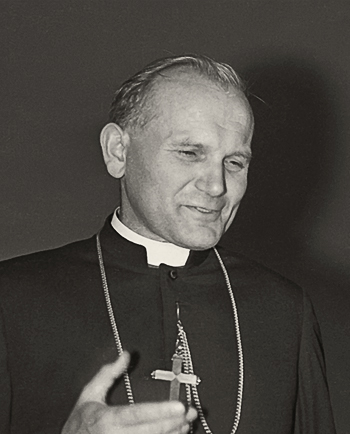
Karol Wojtyła – a Polish Catholic priest, a metropolitan bishop of Krakow, the 264th Pope of the Catholic Church – John Paul II. A philosopher and theologian, ethicist and pedagogue, a poet and playwright.
He was born on 18 May 1920 in Wadowice and died on 2 April 2005 in Vatican. From 1930 to 1938 he attended the 8-year Marcin Wadowita Junior High School and Secondary School for Boys in Wadowice, from which he graduated with excellent grades. After passing his secondary school finals, he started studying Polish language and literature at the Faculty of Philosophy of the Jagiellonian University. During the studies he participated in the meetings of the Catholic Association of Young Men where he came across the texts of St. John of the Cross which strongly influenced his spiritual and intellectual development. In 1942 he joined the clandestine theological seminary in Krakow. He was ordained priest by Cardinal Stefan Sapieha on 1 November 1946. Then he went to Rome to continue his studies at Angelicum (the Pontifical University of Saint Thomas Aquinas). In 1948 he defended his doctoral thesis on the experience of faith and human dignity in the works of St. John of the Cross and he obtained the diploma with the grade summa cum laude. In 1951, on the order of Cardinal Sapieha, he took up scientific work at the Faculty of Theology of the Jagiellonian University (UJ). Based on the postdoctoral dissertation on the attempt to build Christian ethics according to the system of Max Scheler, in 1953 Karol Wojtyła obtained his postdoctoral title (a docent of ethics and moral theology). When the authorities of the communist Poland decided to close the Faculty of Theology of UJ, he gave lectures to the students of the Archbishop Seminary in Krakow, and a year later he started working at the Faculty of Philosophy of the Catholic University of Lublin (KUL). In 1956 he became the associate head of the Chair of Ethics of KUL. At that time, on the basis of his research and lectures, he wrote the book “Miłość i odpowiedzialność” [Love and Responsibility]. On 4 July 1958 Karol Wojtyła was appointed an auxiliary bishop in Krakow. Due to his new duties he had to limit his didactic activity at KUL, but he did not give up his scientific work. In the mid-60’s he wrote the study “Osoba i czyn” [Person and Act], which was a crowning work of his anthropological research.
Apart from the above mentioned works, Cardinal Karol Wojtyła is an author of theological, philosophical and ethical essays published in the “Tygodnik Powszechny” magazine. In 1962 he became the national chaplain to artistic environments and intelligentsia. Also, he took active part in the Second Vatican Council. During the consistory of 1967 archbishop Wojtyła was appointed to be cardinal. On 16 October 1978, in the second round of conclave, he was elected a pope and adopted the name John Paul II. As “a pope from a distant country,” who experienced the tragedy of war and communism, in his teachings he paid special attention to the necessity of the man’s spiritual and intellectual renewal, to the restoration of the natural and supernatural human dignity and to enable individual development of each person in the society in which they live and act together with other people. He died after a serious illness on 2 April 2005. Three months later his beatification process began. On 1 May 2011 John Paul II was beatified by pope Benedict XVI, and on 27 April 2014 he was canonised by pope Francis.
Karol Wojtyła’s philosophy is a philosophy of a person. The author of “Osoba i czyn,” [Person and Act] believes that the man is looking for the truth about himself and that is what philosophy which describes the man should be like – it should reflect the truth about the man, his nature, and about that special personal dimension which is revealed in experiencing humanity and its agency. The notion of a person is the key to the philosophy of Karol Wojtyła. In his philosophy, Wojtyła reaches for Thomism and neo-Thomism, but he also appreciates the achievements of phenomenology within the area of the research on the concept of “I” and person. Wojtyła finds it important to present a person in a complementary and adequate manner, so he attempts to synthesise the classical philosophy of being and the modern philosophy of awareness. However, such philosophy is not a simple eclecticism which links those philosophical traditions – it is an attempt to build a new personalism which goes beyond the present divisions between the schools of philosophy.
In his scientific work Wojtyła is first of all interested in ethics, dealing with the issues of morality and the moral standard. The result of such research is establishing the personalistic standard based on a non-reducible human dignity which firmly requires the rejection of utilitarianism and consumerism in human relations. In the 60’s he developed his research on philosophical anthropology which resulted in a comprehensive study entitled “Osoba i czyn oraz inne studia antropologiczne” [Person and Act and Other Anthropological Studies] in which he presents the meaning of a human act in the subjective dimension (agency) and metaphysical dimension (being). Karol Wojtyła’s personalistic anthropology emphasizes the meaning of human will and self-awareness of action which is necessary for a personal and moral development. In numerous papal documents and the teachings of John Paul II one may find references to his scientific work in which he promotes human dignity from conception to natural death, respecting the right to freedom and individual development of people and communities, as well as the universal calling to sanctity.
